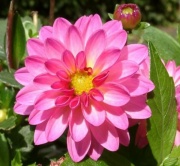Difference between revisions of "Dahlia"
Jump to navigation
Jump to search
(username removed) |
(username removed) |
||
| Line 6: | Line 6: | ||
== Authority == | == Authority == | ||
| − | * | + | * R.J. Adrosko, ''Natural Dyes in the United States'', Smithsonian Institution Press, Washington, DC, 1968 |
| − | * | + | * E.J.LaBarre, ''Dictionary and Encyclopedia of Paper and Paper-making'', Swets & Zeitlinger, Amsterdam, 1969 |
| − | * ''Encyclopedia Britannica'', http://www.britannica.com Comment: "Dahlia." | + | * ''Encyclopedia Britannica'', http://www.britannica.com Comment: "Dahlia." Encyclopædia Britannica. 13 Nov. 2004 . |
* Wikipedia, the free encyclopedia, at http://www.wikipedia.com Comment: http://en.wikipedia.org/wiki/Dahlia | * Wikipedia, the free encyclopedia, at http://www.wikipedia.com Comment: http://en.wikipedia.org/wiki/Dahlia | ||
Revision as of 06:29, 24 July 2013
Description
A natural orange dye obtained from any dahlia flowers, stems, and leaves (Dahlia sp.). Single color dahlia flower petals produce a clearer, brighter tone, than when varying colors and leaves are mixed. On wool with a chrome mordant, yellow dahlia flower petals give a strong orange color that has fair lightfastness. Other colors from yellow to yellow-green (copper mordant) can also be obtained. Dahlia flowers do not dye cotton well and are not lightfast when mordanted with alum. The colorant from dahlia flowers is an acid-base indicator dye that has been used to color test papers. It turns red with acids and green with alkalis.
Authority
- R.J. Adrosko, Natural Dyes in the United States, Smithsonian Institution Press, Washington, DC, 1968
- E.J.LaBarre, Dictionary and Encyclopedia of Paper and Paper-making, Swets & Zeitlinger, Amsterdam, 1969
- Encyclopedia Britannica, http://www.britannica.com Comment: "Dahlia." Encyclopædia Britannica. 13 Nov. 2004 .
- Wikipedia, the free encyclopedia, at http://www.wikipedia.com Comment: http://en.wikipedia.org/wiki/Dahlia
